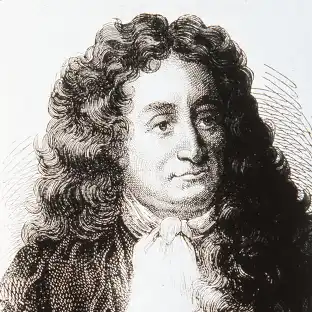
Jean de La Fontaine (1621–1695) was a French poet renowned for his fables, which combined moral lessons with wit and charm. His works remain classics in French literature, celebrated for their timeless insight into human nature, engaging storytelling, and mastery of poetic form. La Fontaine’s influence endures in literary, educational, and cultural contexts worldwide.
Jean de La Fontaine Biography
Jean de La Fontaine was born on July 8, 1621, in Château-Thierry, France, into a bourgeois family. His father, Charles de La Fontaine, was a government official overseeing local waterways and forests, a role that La Fontaine was expected to inherit. However, his passion for literature and philosophy diverted him from this conventional path.
La Fontaine’s education began at the Collège de Reims, but he showed little inclination for academic pursuits. Instead, he found inspiration in classical works by Horace, Virgil, and Plato. In 1647, he married Marie Héricart, though the marriage was reportedly unhappy, prompting La Fontaine to pursue his literary ambitions in Paris.
Initially, La Fontaine wrote in a variety of genres, including plays and operas. However, his talent blossomed when he began composing fables inspired by ancient writers like Aesop, Phaedrus, and Panchatantra. These fables, published in multiple volumes between 1668 and 1694, became his signature works. They offered moral lessons through the antics of animals, often reflecting human follies and societal flaws.
La Fontaine was closely associated with the literary and intellectual elite of his time, including Nicolas Fouquet, a wealthy patron who provided financial support. However, Fouquet’s downfall in 1661 forced La Fontaine to seek other benefactors. Eventually, he gained the patronage of Madame de La Sablière, a generous supporter of the arts.
In 1684, La Fontaine became a member of the Académie Française, cementing his legacy as a literary icon. Despite financial struggles and political challenges, he continued to write prolifically until his death on April 13, 1695, in Paris. La Fontaine’s life was marked by a balance of personal challenges and artistic triumphs, leaving behind a legacy that defined French literature.
Jean de La Fontaine Poems
Jean de La Fontaine’s oeuvre is vast, but his fables stand ouit as his greatest achievementBelow is a curated list of his notable works, particularly fronn his famous “Fables Choisies”:
1. The Fox and the Grapes
A timeless tale about rationalizing failure, this fable introduced the term “sour grapes” into popular discourse.
2. The Ant and the Grasshopper
A moral on the virtues of hard work versus the perils of idleeness
3. The Wolf and the Lamb
A commentary on the abuse of power and the triumph of rmight over right.
4. The Crow and the Fox
A witty exploration of vanity and cunning.
5. The Tortoise and the Hare
A retelling of Aesop’s classic story about perseverance and overcorfidence
6. The Lion and the Rat
A heartwarming lesson on mutual help and gratitude.
7. The Oak and the Reed
A philosophical reflection on flexibility versus rigidity inthe face of adversity.
8. The Frogs Who Desired a King
A political allegory about the dangers of seeking excessiveauthority.
9. The Milkmaid and Her Pail
A humorous caution against counting chickens before they hatch.
10. The Cat Metamorphosed into a Woman
A whimsical tale questioning whether nature can truly change. Each of these works showcases La Fontaine’s ability to weave profound moral teachings with accessible and entertaining narratives.
Jean de La Fontaine Quotes
1.”A person often meets his destiny on the road he took to avoid it.”
2.”Patience and time do more than strength or passion.”
3.”Everyone believes very easily whatever they fear or desire.”
4.”Beware, so long as you live, of judging people by appearances.”
5.”Nothing is as dangerous as an ignorant friend; a wise enemy is to be preferred.”
6.”We must laugh before we are happy, for fear we die before we laugh at all.”
7.”Better to be wise than rich.”
8.”Small minds are much distressed by little things.”
9.”Sadness flies away on the wings of time.”
10.”He is happy whose circumstances suit his temper, but he is more excellent who can suit his temper to any circumstance.”
Jean de La Fontaine Facts
1.Classical Inspiration: La Fontaine was deeply influenced by classical poets like Aesop and Phaedrus, as well as Eastern fables like Panchatantra.
2.Multivolume Fables: His “Fables Choisies” were published in 12 books over 26 years.
3.Political Commentary: Many of his fables subtly criticized French politics and societal norms.
4.Aristocratic Patronage: He relied on wealthy patrons, including Fouquet and Madame de La Sablière, for financial support.
5.Late Bloomer: La Fontaine published his first fable collection at the age of 47.
6.Academic Honor: He was elected to the prestigious Académie Française in 1684.
7.Controversial Figure: La Fontaine’s support for Nicolas Fouquet led to strained relations with King Louis XIV.
8.Cross-Cultural Appeal: His fables have been translated into multiple languages and are taught globally.
9.Legacy in Education: French schoolchildren still study his works today.
10.Enduring Popularity: La Fontaine is regarded as one of the greatest fabulists in literary history.
